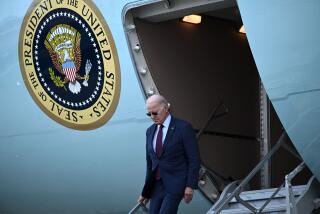ECONOMICS : Yeltsin Aide Coolly Clinical on Allowing Prices to Soar
- Share via
MOSCOW — Yegor T. Gaidar is the new economic czar of the Russian Federation, a land where inflation approaches 450% a year, production is plummeting and the standard of living is expected to worsen by at least one-quarter next year.
So why is this man smiling?
Gaidar, a 35-year-old economist and former columnist with a natural beam to his rosy round face, welcomed reporters in the former meeting hall of the now-defunct Communist Party Secretariat recently by offering jovially to answer questions on the Soviet Union’s “economic mess.”
He then proceeded serenely to describe that mess and his team of young experts’ plans to pull the Russian Federation--and, by extension, the Soviet Union--out of it via the painful road of freeing prices from state control and allowing them to shoot upward.
Unlike many of his perestroika- era predecessors in the Kremlin, the man Russian President Boris N. Yeltsin has put in charge of reforming the crumbling economy wastes no breath on agonizing over the coming hardships or struggling to salvage parts of the Communist dream.
Instead, Gaidar speaks as an economic pragmatist, in a tone that one Western diplomat described as coolly clinical.
The weekly magazine Sobesednik calls Gaidar’s program remarkable in its flexibility.
“It is not the economy that should adjust to Gaidar’s conception, but the conception that adapts to today’s reality,” the magazine said.
Gaidar openly disdains the wishful thinking that characterized Communist-era economists and the ivory-tower approach of many of his current colleagues.
When asked whether he should not begin with slower, more cautious reforms before releasing prices, he makes statements such as this: “In the concrete situation of this country, any long-term discussion about very nice things like structural reform or privatization is absolutely out of touch with the financial reality.”
Instead, he said, “All you can do is jump into the water and try to liberalize prices.”
Similarly, Gaidar backs a “Russia first” economic policy rather than emphasizing joint work with the 11 other remaining Soviet republics because “of course, it is impossible to make policy trying to find a compromise every time” with other republics.
Gaidar’s grandfather, Arkady Gaidar, was a Red Army regiment commander at age 16 who later gained fame as the author of the classic “Timur and His Team,” the tale of a good Bolshevik boy that became the prototype for an entire genre of Communist children’s literature.
As Gaidar brings aboard the young experts he worked with in the economics departments of the Communist Party daily newspaper, Pravda, or more recently among the crisis scholars of the Institute of Political Economy, Soviet pundits refer increasingly to “Yegor and his team.”
Some Soviet and Western economists question whether Gaidar’s reform plan will work, but they universally acknowledge that his staff’s current occupation of the former Old Square headquarters of the Communist Party--now given over to the Russian government--means that the Yeltsin administration is truly committed to radical economic change.
After Gaidar was formally appointed on Nov. 6 as deputy Russian prime minister in charge of the economy, the prestigious Independent newspaper proclaimed, “For the first time, liberals can take power over the economy and Russian reforms can get under way.”
And the daily paper Trud approvingly described the enthusiastic, new-thinking economists Gaidar has brought with him as “young, energetic, wearing cheap jackets and whizzing through the corridors, some discussing things as they walk, others munching sandwiches (because there isn’t time for lunch every day.)”
Lights burn in the imposing building at all hours, and one Soviet journalist reported trying to reach Gaidar in his office after midnight and being told he was too busy to answer the phone.
Gaidar said that his staff is still coalescing and probably will not work out its formal structure for a month or so. “There’s a lot of improvisation, of course, as in any young government,” he said.
Yeltsin, although he has taken full responsibility for the reforms, does not appear to be interfering with Gaidar’s team of experts.
“He does not try to go into details that it is not necessary for a political leader to go into,” Gaidar said of the Russian president. “At least until now, he never tried to impose any political constraint on us.”
Gaidar estimated that if the reforms go as planned, there could be a noticeable improvement in retail store supplies in about two months.
But in general, he makes no promises that the lumbering Soviet economy can be revamped painlessly, and Sobesednik magazine noted that this young Gaidar could turn out to be as merciless in the economic sphere as his grandfather was in his battles in the Caucasus Mountains.
The Avars, a native Caucasus people, “still shake when they remember his name,” the magazine said.
More to Read
Sign up for Essential California
The most important California stories and recommendations in your inbox every morning.
You may occasionally receive promotional content from the Los Angeles Times.










